What are the psychological benefits of travelling alone?
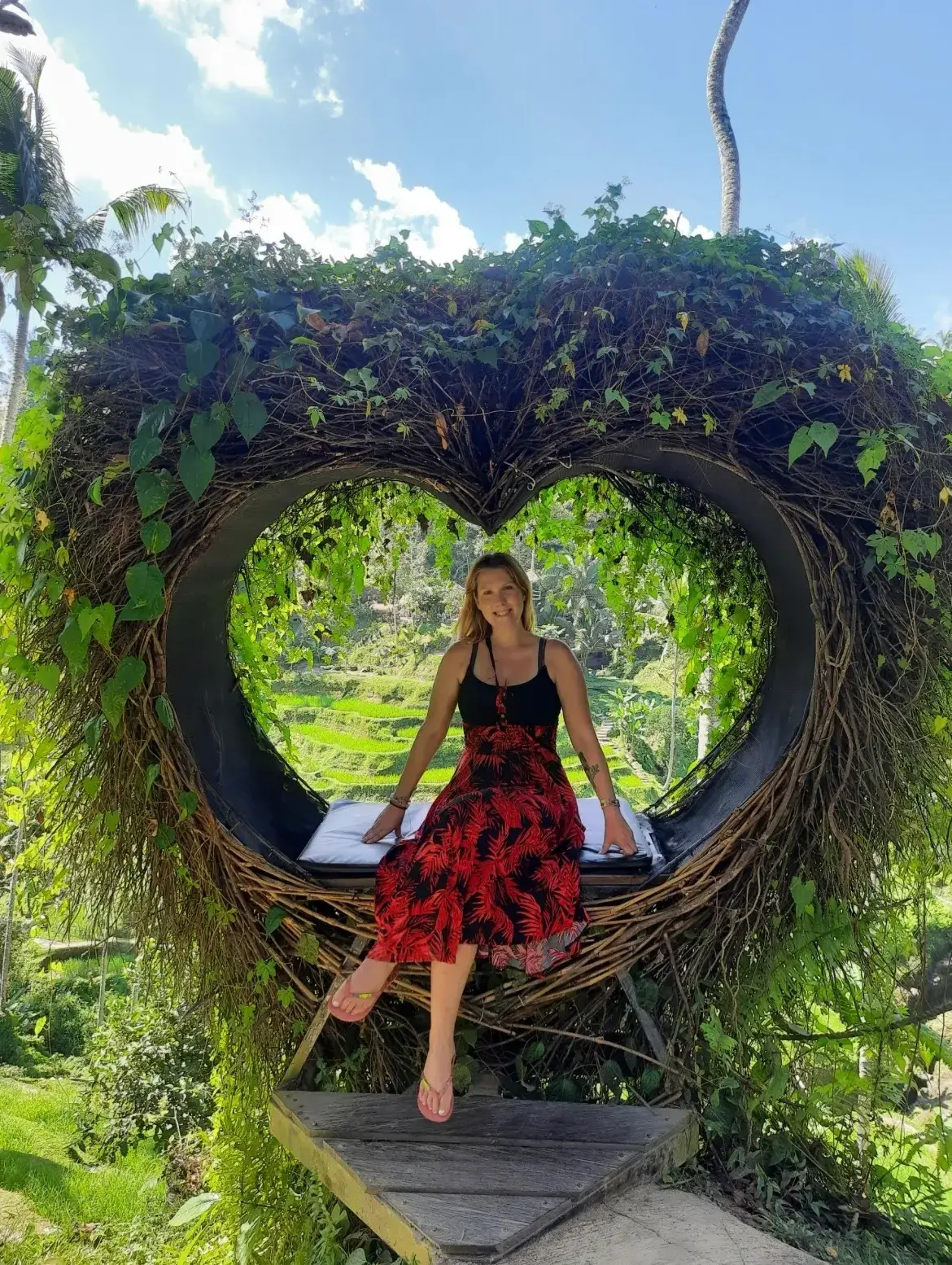
Rice terraces, Bali
Dr Jenna Kirtley, Clinical Psychologist & Regular Contributor
Solo travel is a rewarding way to discover the world on your own terms. However, it may also be daunting, if you are thinking of venturing out on your own for the first time. I have taken a number of solo trips and most recently I travelled South East Asia for three months. I had the best adventure, exploring many countries and learning about different cultures, whilst embarking on some much needed self-discovery.
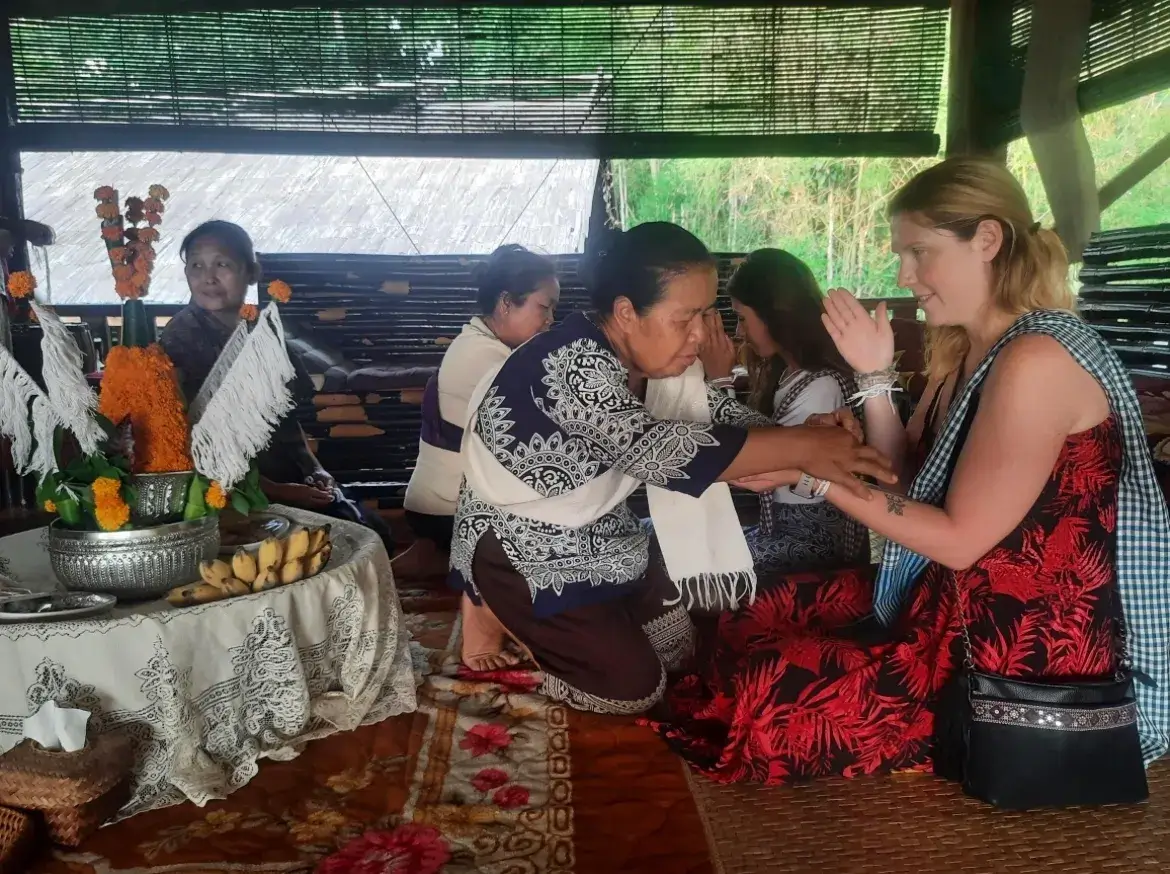
Baci ceremony, Laos
One thing I noticed before I went away was the questions others would ask me; “Is it safe?” “Are you not scared?” “Could you not find anyone to go with you?” “Won’t you get lonely?” I wondered why so many questions focused on the potential “cons” of solo travelling and less on the potential “benefits” of solo travelling. If you, like me, prefer questions like “do you feel empowered?” “do you get to go at your own pace?”
“Do you meet lots of interesting people?” or “do you get to discover new things about yourself?” then this article is for you. It aims to explore the benefits of solo travelling and offer some top tips about getting the most out of travelling alone.
What motivates people to travel solo?
When first pondering this question I decided to turn to one of the female solo traveller groups I am a member of on social media. Some of the phrases used in the group to describe what motivates them were: freedom, being in control, liberating, empowering, own pace, inner peace, pride and self-reflection. I could personally relate to all of these phrases. I then decided to do a little scope of the research to see what this showed. A 2015 report by the International Journal of Tourism Research found that internal feelings of freedom, escape, and bravery were found to be the strongest motivators for solo travellers, particularly female travellers. Another recent study on what motivates people to travel found that transformative experience, freedom, and flexibility were key motivators for solo travellers, while anticipated self-discovery and freedom inspire the potential solo travellers (Ling Yang, 2021).
Studies also indicate how changes in social and political circumstances have afforded women the opportunity to travel solo and that this is a fast growing part of the travel industry (Wilson & Little, 2005; Dempsey, 2015). According to Solo Travel Statistics (2023) there has been a 42% increase in people taking solo trips over the last two years, solo travellers make up 11% of the overall travel market and 84% of solo travellers are women. Solo Traveler World (2023) revealed that over a third of Brits prefer to travel solo.
Well-being and mental health
In a previous article that I wrote, I mention that travel is known to boost emotional wellbeing (Gilbert & Abdullah, 2002), help recovery from depression (Chikani et al., 2005), improve openness and emotional stability (Zimmermann & Neyer, 2013) and relieve stress (APA, 2013). But are there any additional benefits to your overall wellbeing and mental health when you travel solo?
I believe that solo travel helps you to tackle and overcome anxiety, because you have no choice but to deal with situations that arise. There is not another person with you to lean on for support and therefore you learn to trust your own judgement, which in the long-run reduces anxiety in uncertain situations. When you return to your day to day life after travelling, you are likely to feel more equipped to manage certain situations, as you will be able to think back to the time you overcame such obstacles whilst travelling.
When travelling solo, you are forced to step outside your comfort zone and this can be extremely liberating. For me, I found myself renting a scooter and driving out into the mountains, going up in a hot air balloon and canyoneering- all new experiences that made me feel a little nervous at first. However, I pushed myself through those nerves and I felt so content, free and connected to my inner child. I also noticed a sense of pride and accomplishment.
Day to day decision making, without the support of another, helped me build confidence, which was empowering. I also found time alone led to more clarity and creativity. I found myself being able to work on projects and to build on some plans I had in mind.
This ability to sort out stuff I couldn’t seem to fully do when at home was a huge relief and allowed me to relax more than I have done on shorter holidays, or when on holidays with others.
Relationship with self
Travelling alone means you have plenty of time to focus on one very important relationship; the one with yourself. You learn to trust yourself more as you navigate through some new challenges. You can take pride in being self-sufficient and in building lifelong skills, such as problem solving and decision making. There is also lots of time to sit with yourself and self-reflect or engage with meditation. I found myself really tuning into what I needed and, without there being anyone else to check in with, built on the ability to respond to those needs in the moment. As a people pleaser this is something I often neglect in order to put others needs first, however; it is something I not only got good at while away, but I have been able to carry this skill into my life since returning from the trip.
I had so many moments to just breathe and feel inner peace. I would have considered myself an extrovert, who thrived off the energy of others but what I discovered on this trip was that I actually not only enjoyed my own company, but preferred it at times. I was able to find a sense of peace and calm that doesn’t always happen when surrounded by other people.
Self-discovery and building on your relationship with yourself, can help you develop self-compassion, self-esteem and self-soothing, which are all essential in life. Some of this “leaning in” can be painful. There were times I cried and felt emotional pain. I was particularly aware of feelings of grief that I had perhaps been avoiding in my day to day. But with no-one around to worry about I was able to face anything that I had been putting off thinking and “feeling.” All of this is essential to healing and moving forward. Taking a trip solo can help you process difficult emotions and make space for any decisions you need to make about your future.
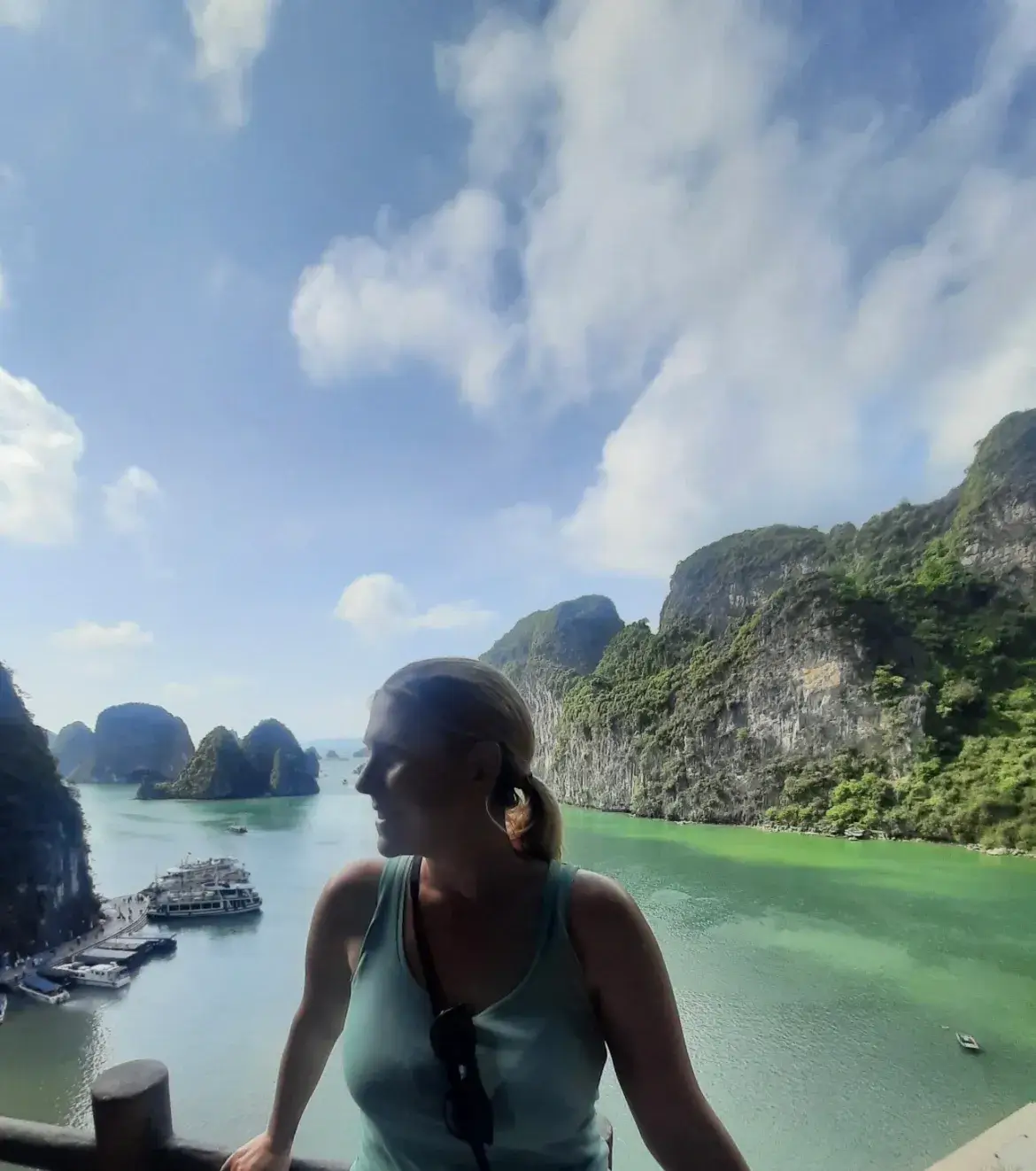
Ha Long Bay, Vietnam
I certainly felt a sense of clarity and connection to self that has had a positive influence on my mood, wellbeing and decision making process, even since the trip has ended.
Relationships with others
One of the things I came across in the literature was that many people reported that travelling solo allowed them to meet people and engage more with strangers than they usually would when travelling with other people. When travelling solo, you have an opportunity to build on social skills and assertiveness skills that might not happen when you are travelling with others. Engaging with people you might not normally engage with could lead you to become more open minded, and less judgemental, of people in general. In addition, when you see how easy it is for you to connect with new people, you will realise that you are an interesting person that others enjoy being around. This could boost your self-esteem and reduce social anxiety.
Relationally you can learn to be comfortable on your own and to rely on yourself. This can impact on your relationships with others in the long-term because when seeking relationships with others you will likely know that it is because you want that relationship not because you “need” it.
Understandably we put a lot of emphasis on building and maintaining relationships with others and this tends to be about long-term relationships whether family, friendships or romantic. However, we probably think less about short-term relationships. By this I mean, how significant are those moments when you interact with a stranger who you may never see again? It may be that such an interaction is quite significant and can have a profound impact on you. For me, there was something special about these connections and at times they were deep and meaningful. These people may not become life-long friends and you may not even see them again, however; that does not make them less valuable. It might be that you learn something about yourself and you may make shifts or changes in your life as a result of such exchanges. You open up in a way you wouldn’t expect with an almost stranger, but it doesn’t feel awkward or shameful, it feels real and profound. Truly being in the moment with another, without attachment and without conditions, is a unique and beautiful thing. This was certainly my experience and I will always value those interactions.
Time and pace
When we travel solo we are free to decide how much time we spend in one place and do not need to worry about another person and their needs. It is possibly the only opportunity where we are released from obligations and expectations from others. You can rest without feeling guilty, take a nap when you want, spend 8 hours in an art gallery (or 10 minutes if you prefer!) and change your mind at any time. You have complete freedom and flexibility to build your own schedule and go at your own pace. You can join groups and tours or head to hostels if you are feeling sociable but equally, if you prefer total solitude, it is your choice to have it.
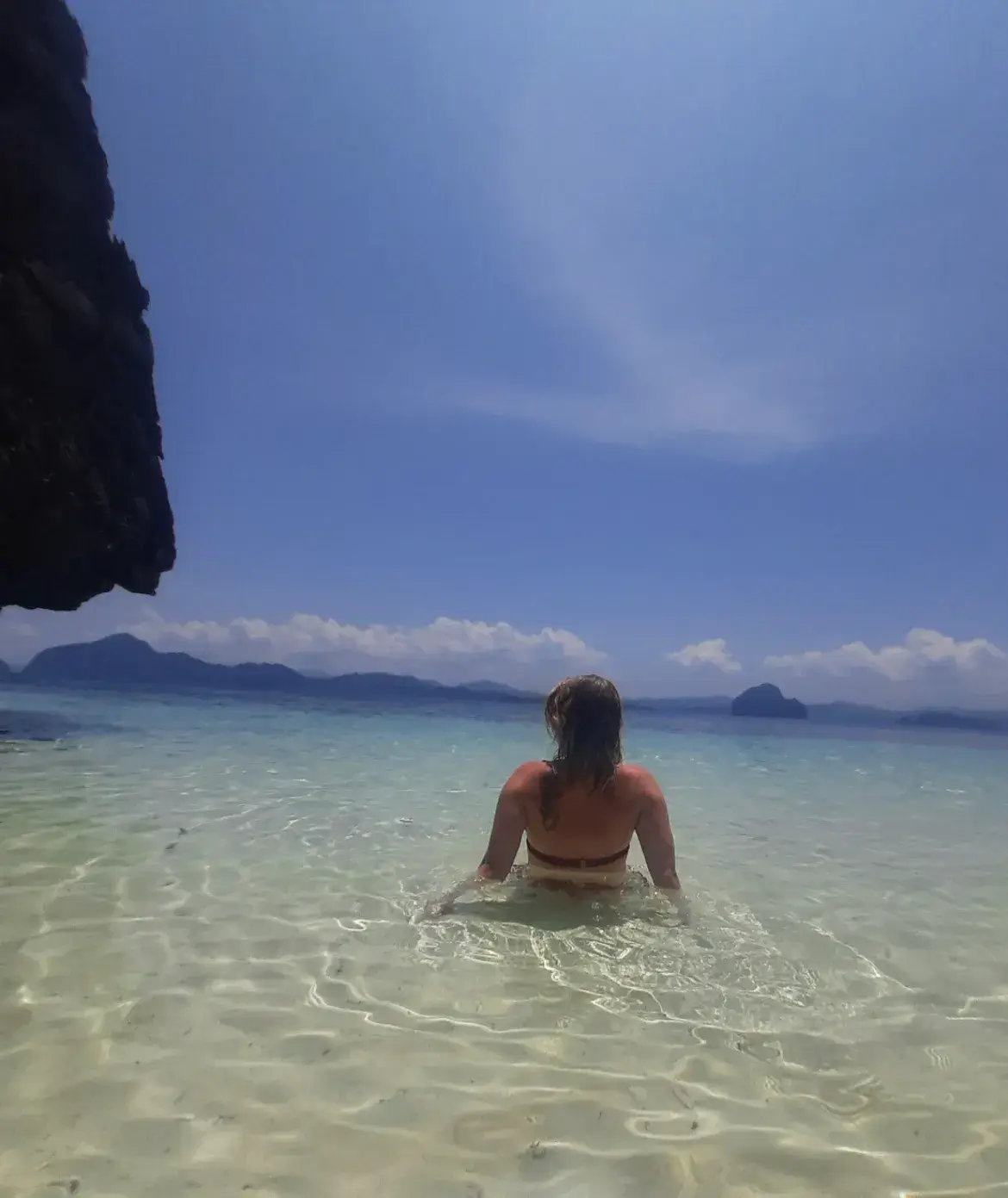
Palawan, The Philippines
Also, in not being distracted by a second person or a group, you have access to more thoughts and sensations that may normally be blocked by others. This is important because it allows you to be more self-aware and attuned to yourself and your needs.
Personality type and travel
I am not keen on putting people into boxes and therefore I am not sure using the terms introvert and extrovert is particularly helpful or meaningful. However, I realise it is common terminology we use to describe whether we are more outgoing and prefer socialising or we are more reflective and prefer
solitude. I mentioned earlier that I found myself questioning my previous belief that I was an extravert, as I seemed to thrive on my own much more than I knew was possible. I met some people who described themselves as introverts but found themselves being pleasantly surprised at their excitement and ability to feel energised by others. I think what is worth noting from this is that both introverts and extroverts can benefit from solo travelling. Introverts can benefit from much needed time on their own to re-energise but are also given opportunities to socialise and build on those skills. Extroverts can find plenty of opportunities to socialise and re-energise, whilst being in a group, but also given opportunities to spend time on their own.
Culture
Travelling alone seems to give you more opportunities to engage with locals and to fully tune into and appreciate the culture. This is possibly due to the fact that understanding the local culture and how people relate to each other requires the sort of attention that can be difficult to gage while with others. You may feel better able to build on language skills, making it even easier to connect with local people. Locals tend to chat to you when they see you are on your own, which could also lead to unexpected invites to share food, visit their family or to show you around the town. In Vietnam, a local tour guide who had travelled alone in the past, wanted to ensure I got some good deals and she spent lots of time with me one on one. She expressed that she wanted to help me because she knew the challenges of travelling alone. I also got in a tricky situation whilst in a local village when I accidentally locked my keys, phone and money in the scooter. People were so kind and hospitable, noticing that I was alone and needed assistance.
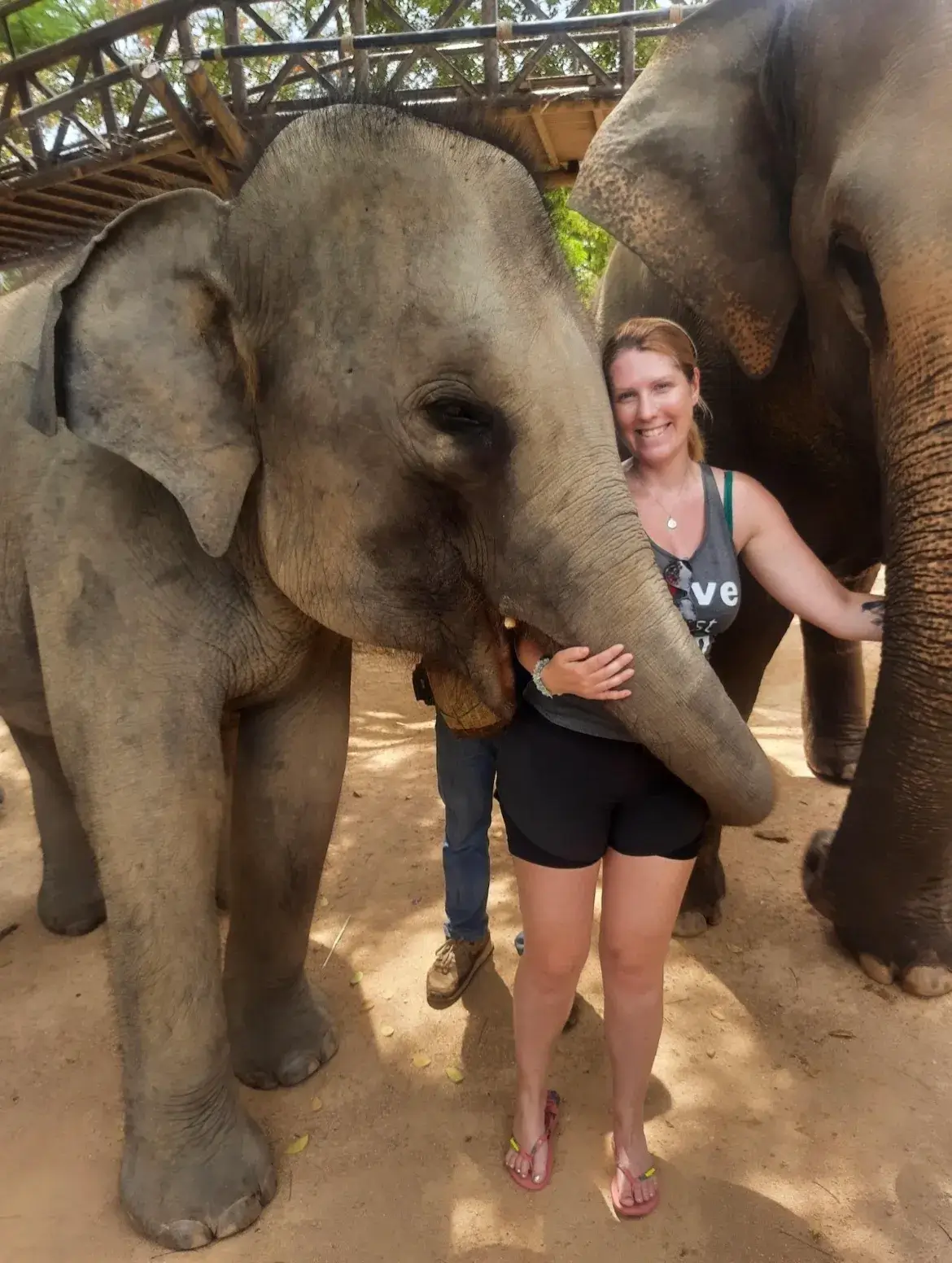
Ko Samui, Thailand
Practical
There are some practical benefits of travelling alone and here are a few I spotted:
- Unsold, single seats offered at discounted prices
- One on one tours at the price of a group tour if no-one else shows up (it happened quite a lot!)
- Grabbing the last seat on the overnight bus or skipping the queue, as there is nearly always one space left
Safety
Physical and psychological safety is extremely important when travelling, and even more so when travelling alone. There may be countries that are high risk and therefore a check on the government travel advice page will help you make a decision on whether to travel. Some countries may pose more risks than others to certain groups of people due to various reasons, such as crime, civil unrest, terrorism, racism, or discrimination. If you are from a minority group there may be some laws, systems or attitudes in the country you are interested in travelling to that could be discriminatory towards you and could ultimately impact on your safety. I would recommend researching the country before going to ensure you have considered the potential risks and can make an informed decision about whether to travel there.
Here are some top tips to minimise risks when solo travelling:
- Know local emergency and embassy numbers
- Learn some of the local language
- Learn about the laws and cultural expectations
- Check out the crime ratings for the area along with any local government advice
- Be alert; use padlocks, store belongings in front of you, hide money in different places and try not to travel with any jewellery or valuables
- Use trusted taxi apps like Grab or Uber
- Never leave baggage unattended or trust a stranger to watch it for you
- Consider tuning in to you and ask yourself: does my body feel safe in this environment?
- Some places may be less safe at different times i.e. at night. It might be worth considering visiting in the day or going as part of a group tour
- Check out groups like female solo travellers for top tips and continued support throughout your trip
- Join group tours for some or all of your trip
- Stay connected with people at home, letting them know you are safe
Loneliness
It is inevitable that while travelling solo you will have times when you feel lonely. I found accepting this early on helped when I did feel lonely as I was able to acknowledge, embrace its normality, and ride the wave of it. I also think loneliness can be a time to untangle thoughts and reflect. It can help you understand your own pace, rhythm and preferences. We rarely have time to just be still and be with ourselves, which is a luxury we get when travelling solo. Sometimes when I felt lonely I would just book myself on a tour the next day or to go to the nearby hostel to hang out. Sometimes I just needed to have a nice meal, a good night’s sleep and a plan for the next few days, which kept me motivated and focused on the next part of the journey.
Summary
Solo travel can promote personal growth, self-discovery and development of independence and resilience. In my experience, it also offered me adventure, clarity, a deeper sense of purpose and more fulfilment in life.
I think it is important to know that the psychological benefits of solo travel can continue when you return home. You have already started to build confidence, self-reliance and trust in yourself, which can apply to your day to day life too. The problem-solving, decision making and social skills you have strengthened can be transferable to situations at work or in your relationships. When you feel anxious or out of your comfort zone you can reflect on how well you coped with this while solo travelling. The ability to tune in to self and recognise your own needs is essential in continuing to develop self-compassion, and can be fully embraced when you return to life back home.
In summary, going travelling makes anyone a more dynamic, open-minded and interesting person, however; doing this on your own can have even more benefits on your wellbeing, sense of self and in growing into the person you want to be.
I want to dedicate this article to myself for being brave enough to be me and embracing every opportunity to travel the world.
References
Bianca, C. (2015). Solo Holiday Travellers: Motivators and drivers of satisfaction and dissatisfaction. The International Journal of Tourism research, 18 (2). https://doi.org/10.1002/jtr.2049
Ling Yang, E. C. (2021) What motivates and hinders people from travelling alone? A study of solo and non-solo travellers, Current Issues in Tourism, 24:17, 2458-2471, DOI: 10.1080/13683500.2020.1839025
Wilson E, Little DE (2005) A “relative escape”? The impact of constraints on women who travel solo. Tour Rev Int 9(2):155–175. https://doi.org/10.3727/ 154427205774791672
Dempsey, C. (2015). Visa Global Travel Intention Study 2015. In PATA Conference.
Solo Travel Statistics (2023) https://www.condorferries.co.uk/solo-travel-statistics
Solo Travel Statistics (2023) https://solotravelerworld.com/about/solo-travel-statistics-data/
Gilbert, D. and Abdullah, J. (2002). A study of the impact of the expectation of a holiday on an individual’s sense of well-being. Journal of Vacation Marketing, 8(4), p.352-361.
Chikani, Vatsal & Reding, Douglas & Gunderson, Paul & Mccarty, Catherine. (2005). Vacations improve mental health among rural women: the Wisconsin Rural Women’s Health Study. WMJ : official publication of the State Medical Society of Wisconsin. 104. 20-3.
Zimmermann, J., & Neyer, F. J. (2013). Do we become a different person when hitting the road? Personality development of sojourners. Journal of personality and social psychology, 105(3), 515–530. https://doi.org/10.1037/a0033019
American Psychological Society. (2013). Stress in America Survey. Retrieved 12th of May 2022: full-report.pdf (apa.org)
If you liked this post please check out our previous post What are the psychological benefits of travel?
